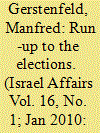| Srl | Item |
| 1 |
ID:
093901


|
|
|
|
|
| Publication |
2010.
|
| Summary/Abstract |
The Israel Our Home (Israel Beiteinu, IB) party became the major surprise of the 2009 elections, winning 15 Knesset seats. Two-thirds of these seats were won through Russian speakers, who entered Israel in the recent waves of Russian Jewish immigration; and a third came from veteran and native Israelis. This composition showed a major dilemma of IB - to find a modus vivendi between the party's nationwide aspirations and its predominantly Russian community character. The IB's electoral success was a result of its concept of a 'population and territories exchange', which was a 'neo-centralist alternative' to both the 'land for peace' of the left and the 'peace for peace' concepts of the right, as well as the charismatic figure of the party leader Avigdor Lieberman, who better than anybody else succeeded in expressing the feeling of frustration of the various peripheral groups in Israeli society.
|
|
|
|
|
|
|
|
|
|
|
|
|
|
|
|
| 2 |
ID:
093896


|
|
|
|
|
| Publication |
2010.
|
| Summary/Abstract |
On 26 October 2008 President Shimon Peres called for new elections. The Knesset was dissolved on 11 November. Three candidates claimed that they were in the running for prime minister: Livni, Netanyahu and Barak. The election campaign would focus more on individuals than on parties. The security issue took high priority in the elections. A major issue throughout the campaign was the position of the leading parties on the establishment of two states for two peoples as part of a peace agreement. The internet became a major tool in the campaign. On the morning of 27 December, the IDF began a war in the Gaza Strip, which Israel called Operation Cast Lead. The major parties agreed to suspend their campaigns until the end of the war. Kadima's victory with 28 seats came as a surprise. The Likud came second with 27 seats, having lost voters at the end of the campaign to the third largest party Yisrael Beiteinu, which ended up with 15 Knesset seats. Looking back at the election campaign one can best define it as a broken and shortened one.
|
|
|
|
|
|
|
|
|
|
|
|
|
|
|
|